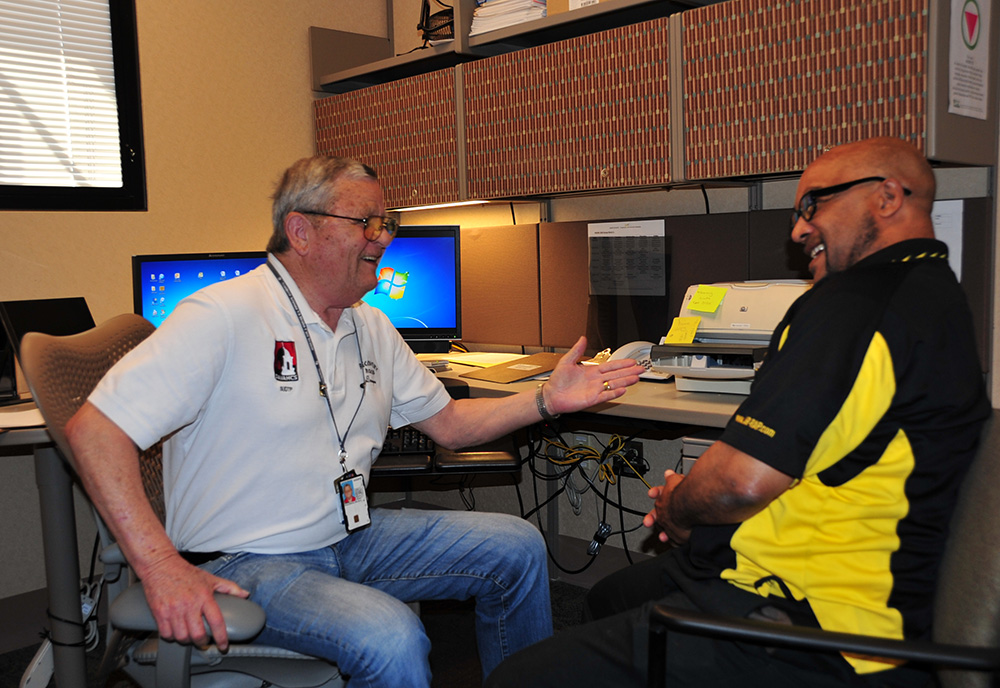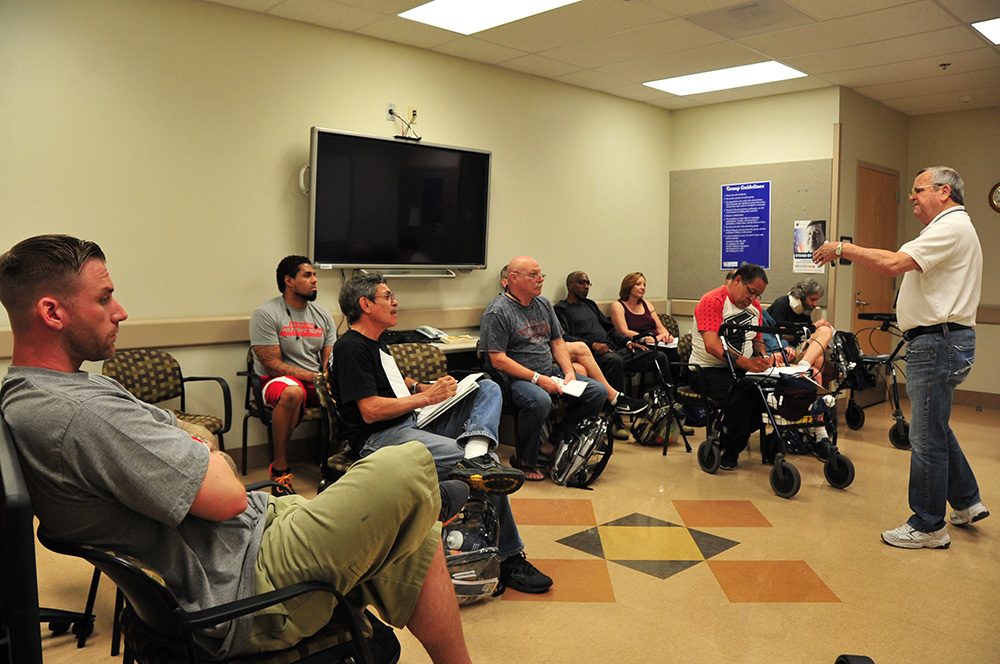Veterans Health Administration
AF Veteran Helping Veterans Out of Addiction

Peer Support Specialist DeWayne Raulerson shares a laugh with Army Veteran Vernon Williams at the Tucson VA. Photo by Clifford Baser
A little over six years ago Willie DeWayne Raulerson woke up beside a dumpster. The dumpster was conveniently located behind his favorite bar.
“It was called ‘The Driftwood,’” he said. “I’d been drinking there for 25 years. Everybody I drank with loved me because I kept them entertained. I was a comedian; I made them laugh.”
But on some level Raulerson knew the laughter and good times could not continue forever. At some point the party was going to end. And one night it did, beside the dumpster.
“After 50 years of drinking it took this one man to flip the switch in my brain.”
“I always had a premonition about that dumpster,” he mused. “I told myself that if I ever woke up next to that dumpster, it would mean I’d finally hit bottom.”
He had hit the bottom. Raulerson’s dumpster premonition had become reality.
“I woke up that morning in my usual stupor,” said the 72-year-old Air Force Veteran. “I got on one knee and all I said was, ‘God help me.’ I called my wife of 48 years, Darleen, and asked her to give me a ride to the VA…
“That decision changed my life,” he added.
But not so fast. Raulerson's addiction still had one last trick up its sleeve.
One West
“I got here at the Tucson VA on a Friday afternoon,” he said. “But I was already planning my weekend. It was one of those three-day weekends, and I was pissed that I wouldn’t be able to drink. So my plan was to go out, get drunk and come back to the VA later.”
But it seems the in-take specialist there at the Tucson VA had a different plan for Raulerson.
“She had me sit in this wheelchair,” he said. “Then she and this policeman wheeled me down to a place they call ‘One West.’ Everybody knows what One West is.”
For those who don’t, ‘One West’ is the Tucson VA’s kinder, gentler version of the Drunk Tank –a safe place where alcoholics can dry out, rest up a bit and perhaps re-evaluate their lives.
“I was there for three days,” Raulerson said. “Then they took me to a place called ‘Stabilization.’ I was there two months.”
From there Raulerson checked himself into Tucson’s in-house Substance Abuse Treatment Program, where he began attending classes, AA meetings, group sessions and individual therapy sessions.
His road to recovery had begun.

Peer Support Specialist DeWayne Raulerson routinely shares his personal story of recovery with fellow Veterans at the Tucson VA. Photo by Clifford Baser
The Light Switch
Raulerson said he’s still grateful to VA in-take specialist who ruined his plans for an alcohol-fueled three-day weekend spent at the Driftwood.
“If she had let me leave that Friday afternoon I wouldn’t have come back,” he admitted. “I know it. I wouldn’t have come back.”
The Air Force Veteran said he’s also eternally grateful to someone else there at the Tucson VA: his addiction therapist.
“After 50 years of drinking it took this one man to flip the switch in my brain. He told me I did not ever have to drink again as long as I live. At first I thought he was an arrogant jerk. But he just struck me somehow, and I started listening to him…
“He’s a Veteran himself, with 16 years of recovery, so he didn’t play around. He told me, ‘If you want help, I’ll help you. If you don’t want help, if you’re not done drinking, go back out and finish.’
Tough words, but they struck home with Raulerson. “I said to myself, ‘This makes sense. I might ought to listen to this man.’
And so he listened.
A Different Ending
“I became teachable,” he said. “I was able to take my addiction out of my brain and move forward into a new life. I learned what gratitude is. My relationship with my wife, my children and my grandchildren changed from abandonment to trust and respect.”
He continued: “I realize that at my age I do not have enough time left to make up for the pain I have caused in the lives of the people I love and who love me. I’ve made my amends with that. I cannot rewrite the book of my life, but thanks to the VA I can change the ending.”
Raulerson is changing the ending by paying forward what VA has given him. He’s now one of seven full-time peer support specialists at the Tucson VA, helping other Veterans find their way out of addiction. He’s been at it, nearly every day, for six years.
“They’re actually paying me to do something I love to do,” he said. “I’ve found my purpose in life. And by the grace of God that’s how I stay clean and sober, listening to these Veterans who come here looking for help. I listen to their stories and I tell them my story. I’m here to navigate them through their recovery and let them know they are not alone.”
But success can be elusive, especially when it comes to beating addiction. Raulerson admitted that most Veterans seeking recovery don’t find it, at least not right away.
“Right now I’m teaching a class of 18 in-patients and numerous out-patients,” he said. “Three of them will make it if they’re lucky. But I don’t get discouraged. If I can help one person then I’ve done all I can do.”
Raulerson said he encourages anyone suffering with addiction to get the help they need now, not later. “Time is something you can never get back,” he said. “Ask for help now, because the definition of courage is ‘doing the next right thing even though you are afraid.’
“I was 65-years-old and drank for 50 years prior to coming to the VA for help,” he added. “I just want Vets to know that it’s never too late.”
Are you a Veteran suffering with alcohol or drug addiction or know a Veteran who is? VA can help. Visit https://www.mentalhealth.va.gov/substanceabuse.asp



















